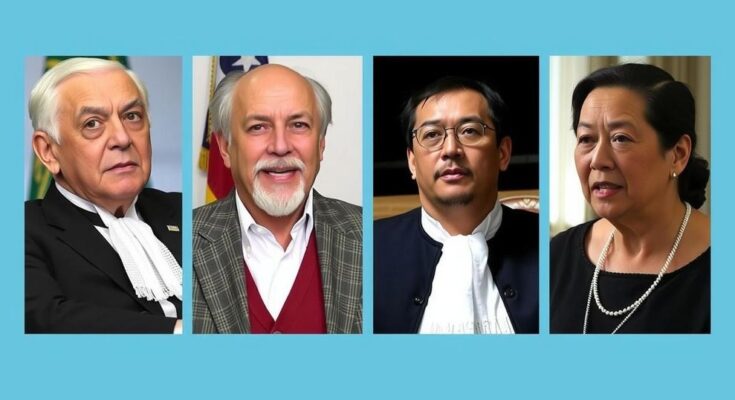Bolivia uniquely holds popular elections for its top judges, a move that has generated controversy and skepticism regarding its impact on judicial integrity and democratic principles. The system has drawn criticism from experts who warn that such elections politicize the judiciary, undermining impartiality. Amidst internal political conflicts, the country’s recent elections reflect a broader struggle for power, raising alarms about the future of democracy in Bolivia.
Bolivia stands alone as the only nation conducting popular elections for its top judicial positions, a system that has increasingly garnered criticism and concerns regarding political influence over the judiciary. Campaigning for the recent judicial elections in La Paz was prohibited, yet candidates found covert ways to promote their names. Citizens expressed apathy towards the elections, viewing the race as a mere exercise in political favoritism rather than a fair assessment of qualifications. As the elections unfolded, the backdrop involved severe power struggles within Bolivia’s ruling party, further complicating the electoral landscape.
The elections, which saw their timeline delayed due to interventions by the supportive Constitutional Court of President Luis Arce, aimed to fill four out of nine critical roles on the court. Experts have long warned of the dangers posed by judicial elections, fearing they might undermine the crucial checks and balances necessary for a functional democracy. The recurring pattern of voters increasingly disillusioned with their choices suggests a deep-rooted crisis of legitimacy within the electoral process.
Analysts note that electoral turnout has historically been low and the legitimacy of elected judges remains in question. Notable events include the former President Evo Morales utilizing the courts to manipulate electoral outcomes when faced with opposition. Morales’ tenure, which transitioned to a turbulent exit marked by allegations of fraud, exemplifies the consequential intertwining of judiciary and political maneuvering in Bolivia. Furthermore, recent legal actions against Morales have exposed the volatile reality of a politicized judiciary.
The scrutiny and implications of Bolivia’s judicial elections extend beyond its borders, with other nations, particularly Mexico, observing these proceedings. This scenario has initiated discussions surrounding the efficacy and viability of judicial elections in the broader context of Latin American democracies. As experts anticipate the ramifications of Bolivia’s elections, the lesson appears stark: the election of judges may not merely serve as a democratic exercise but could significantly impact the integrity of the judicial system itself.
Judicial elections in Bolivia are a controversial mechanism designed to increase public participation in the judiciary, replacing a system based on qualifications and training in 2009. The backdrop of these elections involves significant political turmoil, particularly following Bolivia’s former President Evo Morales’s reforms aimed at eradicating corruption. In recent developments, current President Luis Arce’s influence over the Constitutional Court highlights the ongoing power struggles within the ruling party, raising further questions about the integrity of the election process. Observers have noted that the political nature of judicial elections may compromise the independence of the judiciary, threatening democratic processes throughout the region.
In conclusion, Bolivia’s judicial elections underscore significant concerns regarding the intersections of politics and the judiciary. With a history of low voter engagement and doubts about the legitimacy of elected judges, the elections reveal profound implications for democratic governance in the country and Latin America as a whole. The ongoing struggles within the ruling political faction and past manipulations of the judiciary illustrate the complexities and challenges in establishing an impartial judicial system, indicating potential pitfalls for judicial reforms in other countries, such as Mexico.
Original Source: abcnews.go.com




